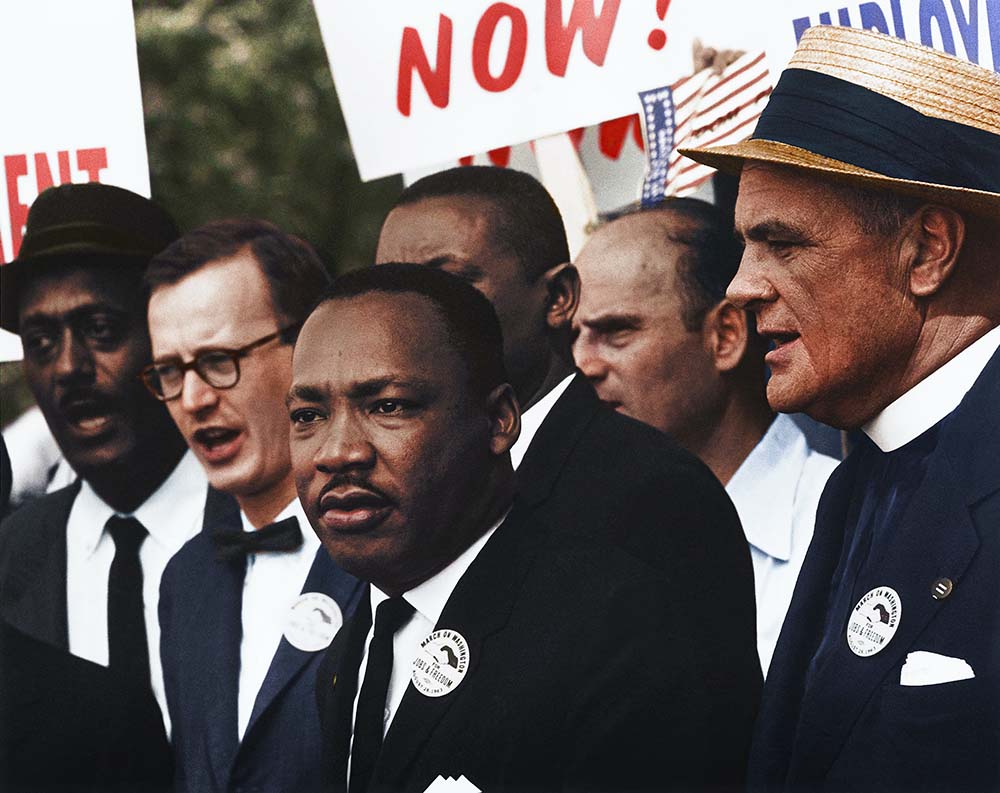Community Engagement Racial Disparities January 15, 2023
Jan 16 is Martin Luther King, Jr. Day, but the commitment of the Safety and Justice Challenge (SJC) to improving racial and ethnic equity in the jail system runs year-round.
With that in mind, here are several blogs on the theme of racial and ethnic justice featuring members of SJC from the last year.
Reckoning with the Legacy of the Tulsa Race Massacre
Members of the Safety and Justice Challenge learned during their annual convening in January 2022 about how Tulsa, Oklahoma has struggled to reckon with the legacy of its 1921 Race Massacre. The discussion showed how Tulsa’s history impacts its present. It also demonstrated the complexity any jurisdiction must face in navigating ongoing inequities as it seeks to lower its jail populations sustainably and fairly. Madison Dawkins, manager of local partnerships at the Square One Project, chaired the discussion.
Two years since George Floyd, The Challenge of Sustaining Momentum for Reform
May 25, 2020 marked two years since Minneapolis Police Officer Derek Chauvin murdered George Floyd. Following his death, people protested racial injustice in the criminal justice system across the country and beyond, and as a result, some cities and counties pledged to make significant changes to law enforcement. But in conversations with people involved with the Safety and Justice Challenge, many reflected on how not enough has changed in two years since Mr. Floyd’s death and how the landscape for criminal justice reforms is now becoming more challenging. And yet, they also pointed to areas of progress.
A New “Tap-In” Center Aims to Restore Community Trust
There is new hope in St. Louis County for people afraid to move on with their lives or engage with the criminal justice system because of unresolved warrants, municipal code violations, or having missed a court date. The “tap-in” center, which is part of a national effort to lower jail populations in jurisdictions across the country as part of the Safety and Justice Challenge, aids in responding to concerns raised by the Department of Justice about racial injustice related to municipal court practices in its 2015 investigation into the Ferguson Police Department which is located in the northern part of St. Louis County.
Linking Mass Incarceration to Black History in Los Angeles and Beyond
Members of the Safety and Justice Challenge grappled with questions about how mass incarceration is linked to Black history at a recent fireside chat during the annual convening of SJC network members. Bria L. Gillum, Senior Program Officer, Criminal Justice with the MacArthur Foundation hosted the conversation with Kelly Lytle Hernandez, a professor of History and African American Studies at University of California, Los Angeles. She is also a member of the SJC Advisory Council and a MacArthur Fellow.
A Deeper Look at Racial Disparity Data in Jails
Cities and counties participating in the Safety and Justice Challenge significantly reduced their jail populations over the past few years – both prior to and following the COVID-19 pandemic. Despite that progress, racial and ethnic disparities in jails persist. In early 2022, the SJC selected four jurisdictions to join a new Racial Equity Cohort based on proposals that explicitly focus on racial and ethnic equity in the criminal justice system; center lived experiences of Black, Indigenous, Latinx, and other people of color; and emphasize the SJC Community Engagement Pillars of authenticity, accessibility and transparency, respect for diversity, and commitment to ongoing engagement. Reagan Daly and Stephanie Rosoff with the Institute for State and Local Governance investigate the data.
Focusing on Racial Equity in the Justice System
Hear from SJC sites in Philadelphia, Chicago and New Orleans about their efforts as part of the new racial equity cohort.
Finding Our Voice to Reduce Native American Incarceration Across SJC Sites
November is Native American Heritage month. It gives a platform for Native people in the United States of America to share their culture, traditions, music, crafts, dance, and ways and concepts of life. It is also an appropriate time to highlight the overrepresentation of Indigenous people in jails across the country while actively pursuing solutions. Michaela Seiber, MPH, blogged about a recent trip she took to Pima County, Arizona, from Minnehaha County in South Dakota to see how Pima County’s SJC initiative is working with the community to reduce incarceration and improve health outcomes.
A Q&A on Hispanic Heritage Month with 70 Million Creator Juleyka Lantigua
70 Million, LWC Studios’ podcast about criminal justice reform, was nominated for a Peabody Award and won several others. Juleyka reflects on the rising-majority population of the country, the local impact of jails, and the role of racial and ethnic equity in reform.
Counties Enhancing Racial Equity in the Criminal Justice System through Grantmaking
The National Association of Counties, in partnership with the National Criminal Justice Association and with support from the Bureau of Justice Assistance, has released a toolkit for counties interested in addressing racial and ethnic disparities in the criminal legal system through grantmaking. The toolkit outlines eight principles, developed by a working group of county stakeholders, state administering agency representatives, and community-led organization leaders, to help enhance equity in the criminal legal system. It features several communities participating in the Safety and Justice Challenge.


